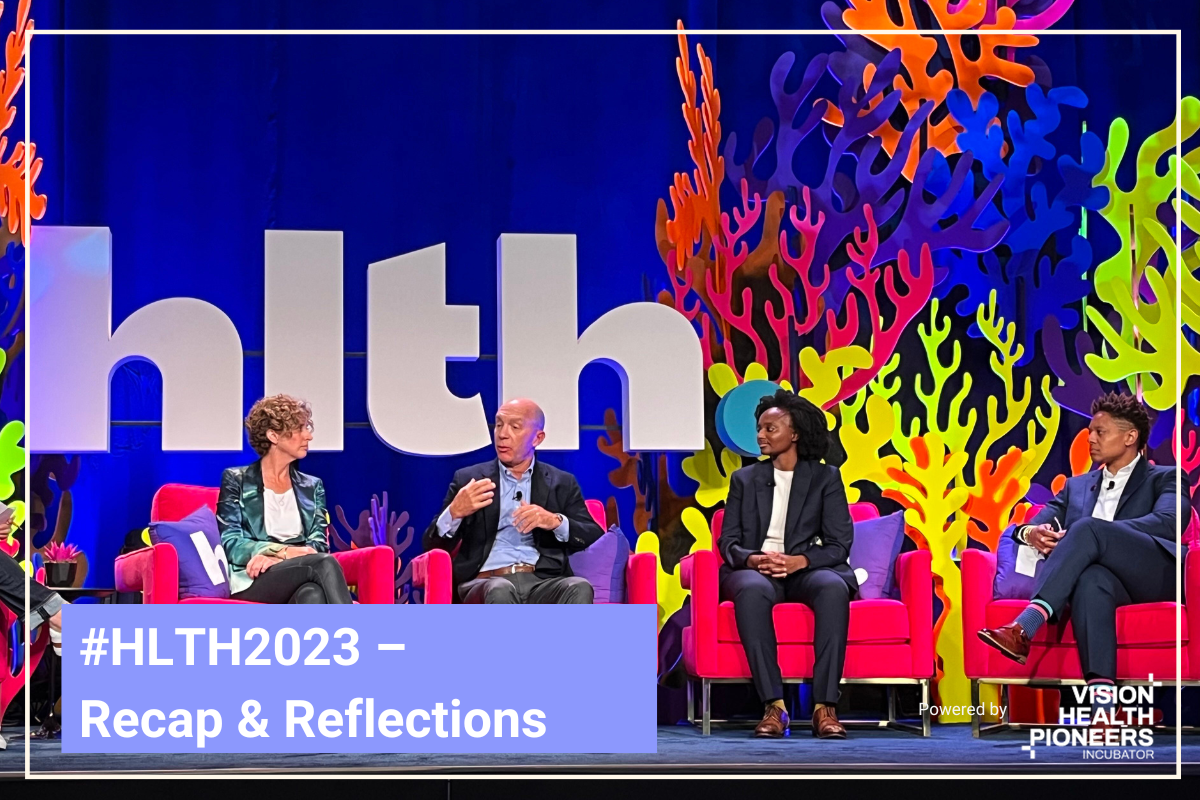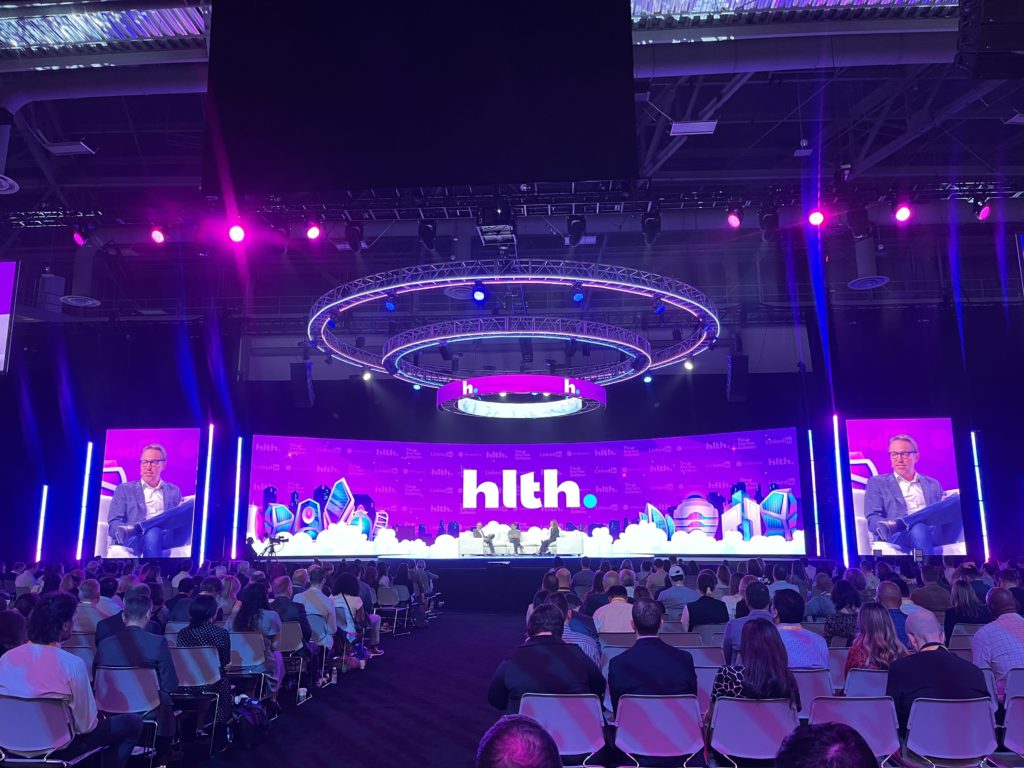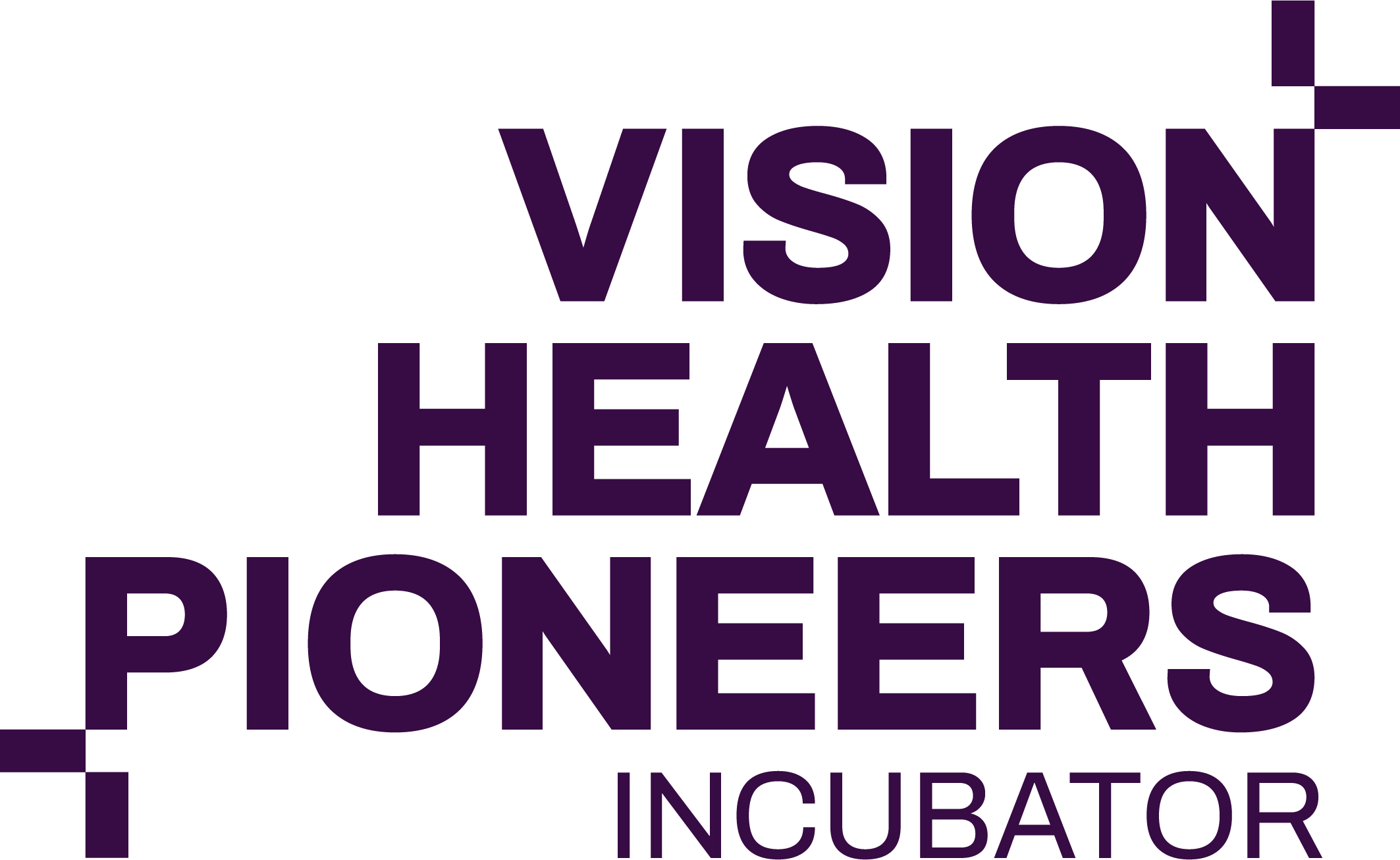
01 Nov HLTH 2023 Las Vegas – recap & reflections
In the wake of the pandemic, healthcare systems worldwide are left heavily overburdened. This has resulted in diminishing patient care, long waiting times for e.g. therapy seekers, and unbearable levels of stress on healthcare staff.
The good news is that digital health startups are providing solutions to healthcare’s biggest pain points. While none of these solutions will be a silver bullet, when these startups come together and co-create solutions as an integrated ecosystem, we can revolutionize patient care and “elevate humanity.” This was the mission of HLTH2023 that united the digital healthcare ecosystem – and we were stoked to be part of it! While much of the energy of the conference will forever linger within and between attendees, we have done our best to capture it, and bring you the most memorable experiences and insights! Ready for launch 🚀
Generative AI and the Future of Healthcare
Our HLTH crew member Sandra Bucholz observed one major, cutting-edge trend: Generative Artificial Intelligence, or Gen AI. While you might already be familiar with Gen AI’s ability to create images from text inputs (think DALL-E or Midjourney) or transform textual prompts into coherent narratives (as seen with chatGPT), its versatility extends even further. Remarkably, Gen AI is finding a growing role within the healthcare sector, where it holds immense promise for elevating patient care, expediting medical research, and optimizing the efficiency of healthcare practices.
We identified three areas where Gen AI is already creating an enormous impact: Medical Image Analysis, Drug Discovery, and as a virtual health assistant.
- Generative AI can analyze medical images such as X-rays, MRIs, and CT scans with remarkable accuracy. It can assist radiologists in identifying anomalies, tumors, or other medical conditions, potentially leading to faster and more accurate diagnoses.
- Furthermore, the technology can accelerate drug discovery by helping researchers generate novel molecular structures and predict their potential for therapeutic use. This speeds up the drug development process, potentially leading to the creation of new treatments for various diseases. One example of a startup in this field is the San Fransico-based Atomwise, an AI-driven drug discovery platform that employs deep learning models to analyze and generate potential drug compounds.
- Gen AI also plays a role as a virtual health assistant. For example, our cohort team Mexb.ai has developed their chatbot Ora, which provides real-time mental health support to individuals, where and whenever they need it the most.
While there are now close to 4,000 Digital Health ventures that are powering their services using Gen AI, only 2% of all Digital Health ventures worldwide report using it. We expect a higher adoption rate as the tech matures. And until now, as Sandra reports, investors are still waiting for end-to-end, transformative Gen AI applications and horizontal platforms to support improved governance and quality differentiation.
On the Faces of Digital Health podcast about Gen AI in healthcare, Justin Norden, Partner at GSR Ventures, has the following advice for startups exploring the tech:
“I encourage startups to cultivate curiosity about technology capabilities, align these capabilities with customer needs, and explore how generative AI can be integrated into existing solutions, both externally and internally. Staying informed about developments in the field is crucial, whether through personal research or by assigning someone on their team to do so.
On X, Ritesh Patel from FINN Partners spoke with Healthcare IT Today on the power of AI in healthcare for enhancing efficiency and workflow. Here are his thoughts:
Ritesh Patel shares the power of AI in healthcare for enhancing efficiency and workflow, offering solutions for healthcare workers. While AI holds great potential, the challenge remains to apply it in a way that best serves patients and healthcare providers. #HLTH2023 #HealthTech pic.twitter.com/lX4Jawzgxw
— Healthcare IT Today (@hcittoday) October 24, 2023
The Link between Workplace Culture and Wellbeing
Vision Health Pioneers’ Program Manager Darja Kota got the chance to attend the panel “Connecting Workplace Culture and Wellbeing” with Headspace CEO Russell Glass and LinkedIn CEO Ryan Roslansky.
As mental health is moving out of the shadows, more people are talking openly about mental health issues such as burnout. Timely, because the global state of mental health is alarming. According to the World Health Organization (WHO), approximately 450 million people worldwide are living with mental health disorders. This is also visible in the workplace. In the US, for example, 4 out of 10 workers report that their job negatively or somewhat negatively impacts their mental health. In Europe, mental health problems have become one of the leading causes of absenteeism from work and early retirement.
How can organizations take preventative measures to promote the well-being of their staff? While providing access to self-care tools is an important first step, investing in a healthy organizational culture is crucial.
Ask yourself critical questions, such as:
- How are we enabling people to take ownership and have agency?
- What are we doing to create a sense of belonging among people at all levels of the organization?
- What systems are in place to ensure your people have access to personal and professional learning opportunities?
There’s also an important business case to be made: Investing in leadership effectiveness and workplace culture can lead to 3x returns to shareholders for top-performing companies and leads to higher employee engagement and retention, which in turn serves as a great attractor for top talent.
At Vision Health Pioneers, we have a strong commitment to transforming workplace culture toward greater well-being and belonging. Our alumni startup nilo.health, which was recently selected as one of the LinkedIn Top Startups 2023 in Germany, is leading the way in Europe in providing comprehensive and accessible workplace mental health support.

Peering into #digitalhealth 2024
What are your live impressions from HLTH2023 and what are the tech trends in digital health for 2024? We asked our friends in the network, and these are their answers!



